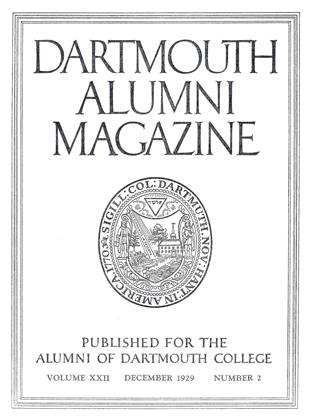The following communication to the NewYork Times is certainly as high praise as Dartmouth could desire to have its injured star, Alton K. Marsters '30 receive. The letter follows:
The last thing Beau Olcott did before he died last night was to write to A1 Marsters, captain and quarterback of the Dartmouth team, the letter below.
Olcott was a Yale man dyed in the wool, All-American centre on Gordon Brown's famous Yale team of 1900. In A1 Sharpe's regime at Yale lie was in charge of Yale freshman football. In recent years he had coached football and sportsmanship at a school almost under the eaves of Yale.
When Olcott's life went out last night he left a light burning in the lives of thousands of boys and men who had played with him and under him on Yale and other fields. It seems the right of many to read this letter from a great football man, dictated with the last bit of strength he had.
At a time when two universities cannot play together because of some wrong spirit which has crept in and been allowed to grow, a letter like this from a great player and coach to the captain of a team which almost defeated his own college seems reassuring.
GEORGE ST. JOHN, Headmaster, the Choate School, Wallingford, Conn. Nov. 3, 1929. (Enclosure)
Dear Alton Marsters: I am so much of an invalid that I cannot write, myself, but, as an old Yale centre and a coach of many years, wish to give my admiring homage to such a sterling exhibition of good sportsmanship and good football as Dartmouth showed on Nov. 2.
I saw you play two years ago—that was the last time that I was able to see any game —and I then picked you for one of the best backs that I had ever seen.
I can't tell you how glad I am that you have so superbly justified that opinion and how sorry I was to see so gallant a team meet defeat in the way it did after so great a battle.
I send my best wishes to you and the Dartmouth team for the rest of the season and through life.
Sincerely yours, H. P. OLCOTT, Yale 1901
 View Full Issue
View Full Issue
More From This Issue
-
 Class Notes
Class NotesCLASS OF 1923
December 1929 By Truman T. Metzel -
 Article
ArticleAlumni Associations
December 1929 -
 Article
ArticleAlumni Council Meets in New York
December 1929 -
 Article
ArticleCarnegie Report
December 1929 -
 Article
ArticleThe Dartmouth Indians
December 1929 By Eric P. Kelly -
 Sports
SportsThe Yale Epic
December 1929 By Phil Sherman







